Demographics
Roughly speaking, CBYX for Young Professionals participants have a variety of reasons to go to Germany. I’ll try to outline some of them:
- Family or historical connection to Germany
- I do get the feeling that people from the Midwest are most like Germans in their honesty and expressions (they say ”come with,” or in German: “kommst du mit?“)
- Bored of their office job after graduating and need an adventure
- Limited life experience and need some programs to build up their resume and career
- Gap year
- Doing a program to put off adult life, finding a job, defer student loans, etc.
- Apparently it’s a thing for some people to jump from fellowship to fellowship (Auxiliares, etc.) after graduating? But none of them pay all that well so it’s a rough spot.
- People also cycle into doing a Master’s program if they don’t know what they want to do after graduating undergrad. It’s something I’ve seen over and over again.
- Side note: Internationals also often do Master’s programs to get a foothold in the US job market.
It’s really a program meant for high schoolers, and from experience talking to people who organized the program, that’s the one that matters more.
Some History
If you’re looking at applying or just knowing the history, it’s worth reading these articles:
- https://eca.state.gov/files/bureau/cbyx-cbbsx_nofo.pdf
- https://files.eric.ed.gov/fulltext/ED420288.pdf
- https://www.google.com/books/edition/Global_Exchanges/JwPDDgAAQBAJ?hl=en&gbpv=1&dq=cbyx&pg=PA79&printsec=frontcover
Some interesting things:
- People in DC are quick about wondering what you do and where you are in life
- The German side funded part of the exchange when the American side thought about canceling it
- Security clearances for the federal government is a process where they go around interviewing people you go, highly casual
- Fulbright ETA is more for the name than program support
- Two+ people in an embassy or there’s a chance one might murder the other
- The German and French embassy supposedly share chefs
- When negotiating trade deals between countries, people do it by breaking it down into different divisions

As a part of CBYX 37 (cancelled due to COVID), we got a chance to hang out around DC and tour the German embassy. This is a program that causes you to cross path with a lot of government folks and people on those tracks. And while there are smart people, I get the feeling that they’re too partisan to see the big picture? I mean, it’s a government program, so the problem isn’t being partisan. The problem is not having the full picture due to ideology, which limits the quality of the decisions you make.
For example, a guy in DC said that China is debt-trapping countries such as Sri Lanka and stealing their ports. I talked to a guy from Sri Lanka in college, and he said that the president was super corrupt and embezzling a lot of money and seeking loans from a bunch of countries, including China. So he got ousted last summer and people stormed the palace. But it certainly contradicts the mainstream idea and is more believable, and the DC guy just pointed me to a Vox article as his proof.
State Department, Georgetown
The program starts with a welcome dinner at Georgetown and a visit to the State Department. Georgetown is a real pretty campus. I found it interesting that it had a giant fence around it despite being in a great city. Georgia Tech’s open campus in Atlanta doesn’t always feel great. Since there are a lot of people on the program, it’s only natural that you get dorms (Darnall Hall iirc).
Being a diplomat, I think, is tough work. You don’t necessarily get the best placements and it’s hard if you want a family. Also, you need at least three people stationed somewhere because it’s possible that one of them kills the other. There was an event on some remote island. I also heard that the ambassador to “good” countries such as Germany tends to be a reward for loyalty to the current government, or a ‘cushy gig’. Though this may seem surprising to those who believe in meritocracy, the world actually runs on nepotism.
Language School Overview
I enjoyed language school at the Carl-Duisberg Centern in Cologne. Learning German is dependent upon your personal motivation on a day to day basis, like most things in life. We had a variety of people from different countries, but most people stuck to their own country-specific groups. There were also a lot of people from South America and Central America as a part of DAAD.
We spent some time going to museums, cleaning these golden stones called stolpersteine, and going on tours around the city.
I did meet some people who came over to Germany by themselves (one from Chicagoland, one from Quebec) and enrolled in language school themselves. You definitely don’t need CBYX to come over here, but it gives a good setup with appointments for your residency card, a place to live, some people to hang out with, and so on.
Some Americans in Cologne did not like techno music. Americans also have a tendency to go to sandwich shops when abroad for some reason. This is the second time I’ve seen it. The sandwich shop and doner place near language school was often frequented.
Housing, Logistics, etc.
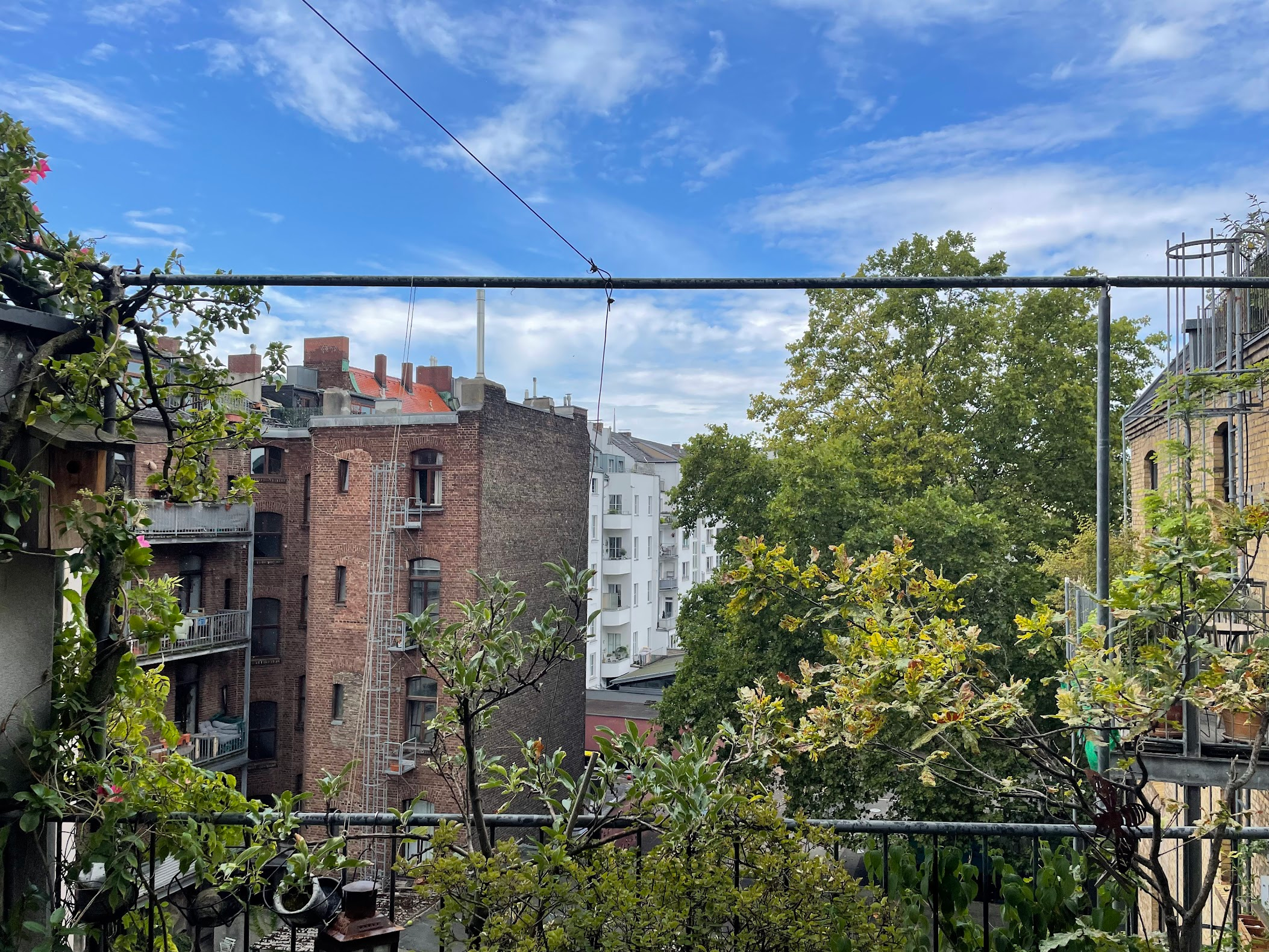
I got lucky in the places I lived. They were both close to the city center (Agnesviertel, Sülz) but I knew some people had to commute quite some distance on the S-Bahn. The first place I lived in Cologne was like a brownstone. It was run by an old couple who had been there since after the second world war. In the basement, you could see photos of a burned out husk of the building, and everything since then has been the improvements of the residents.
This represented a type of labor, community, or group feeling that I feel is missing from modern life.
However, both places had people who watched a lot of television for most of the day. I thought this was really sad, and I hope to avoid a similar fate. Even though they live in such a wonderful city in Germany in such a wonderful place (objectively), living in such a place gets ‘normal’ after one to two months.
The program doesn’t guarantee good housing, and having ‘good’ housing for the entire duration of the program is rare. Participants’ stability will always be second to whatever the homeowner needs to do. I know many people who were moved around and whatnot. Though the program offers a host family, in practice I’d suspect it’s mostly for the high schoolers. For the Young Professionals program, it’s often apartments, dorms, or whoever is renting out their spare room for extra money. This is unfortunately opposite to the idea of cultural integration and having a host family.
These people often tended to be older women, and it really highlighted a phenomenon I saw again in Jimmy Carter’s book On the Virtue of Aging:
There is a special problem, however, with many aging Americans who are not wealthy, or whose retirement savings are expended several years before the end of life. This is of particular concern to older women, who become an increasing majority with advancing age. In the nursing home with Rosalynn’s mother, there are twenty-seven other women and only six men. Sixty percent of Medicare recipients are female, and they use the benefits an average of fifteen years, compared to only seven years for men. The income of older women living alone is only about half that of men, they usually have smaller estates than men, and they become impoverished more quickly as their assets are frequently used to pay for nursing home care.
Why does this happen? Why women?
Those who pack a lot of things will likely struggle with the frequent moves common on the program. I don’t recommend shipping luggage from one city to another because of the chance of losing it. Use airtags.
Is it hard to get used to Germany?
Personally, not really. You land, get a SIM card (I had a 15 EUR O2 prepaid plan, but I would use virtual data like Airalo in the future because SIM swapping is a PITA), register for a bank (N26 usually), download some apps (DB), learn some German, and so on. The most difficult part about moving to a place is arranging housing. Visa and permanent residency are a close second. Supermarkets are easy to get to as you don’t need a car, the Germans are direct but are quick to come to an understanding, and it really didn’t feel that different to me. The culture isn’t something you take personally. It felt normal.
It’s hard to come to Germany if someone doesn’t speak a European language, if they don’t have living arrangements set up, if they have to get a visa, if they don’t have any connections in the country, if someone lacks money, and so on.
I hate to mention this, but if you’re not used to walking and have significant difficulty walking, then Germany will be hard to get used to.
On the German medical system
Pretty straightforward. The program gives people tourist insurance through Dr. Walter rather than real public insurance like TK, so you’d have to pay in advance. One receptionist in Cologne mentioned how the socialized system was being taken advantage of. This is a parallel I see having had a conversation with an older guy I know who gets Medicare (automatic because of age). He said how the doctors just bill ‘whatever’ because it’s one giant opaque system.
I ask myself if these socialized systems will fail because people will take more than they give. For my generation, I don’t think we can count on a guaranteed retirement.
Public health insurance is also necessary for enrollment in universities in Germany. Somehow, the program has a connection with TK Krankenkasse so they end up just printing you an exemption form rather than the program getting… public insurance? On the other hand, DAAD participants also didn’t get public insurance. So there’s likely a reason on the German side.
Chinese people and German schools
I hung out with a few Chinese people while living in Germany. I learned that many come to do a Master’s degree in engineering fields. They frequently travel between cities to take the DSH exam, which apparently varies in difficulty.
It’s also common for a company in China to pre-arrange housing (usually bad quality) in university cities plus a language course for people who wanted to go abroad to study. The general consensus in China is that German university is good for price, but the language is a significant barrier.
Landtag Nordrhein Westfalen
This was a really cool place to visit. It’s in Düsseldorf, north of Cologne and the capital seat of NRW. We talked about how ‘circles’ are represented in the design of the building because they signify harmony, and there are multiple different circular rooms that are meeting rooms for individual parties. The presenter said they did not like AfD, so they sit at a distance twice that of the other parties.
I found it interesting that the security guards were of Turkish descent, much like security guards at the State Department in DC were black people. The Bundestag did not observe this same phenomenon.

I visited Bulgaria
Sofia has a beautiful airport. You walk out and see the mountains. You take a train to the city center. It’s old, gray, Communist style with the fences along the roads, sorta crumbling, but the downtown is quite charming. Globalization really has made its mark. I saw an Oktoberfest festival and Japanese Sando sandwiches. There wasn’t an Apple store, but there was a store that looked like an Apple store and carried the latest phones.
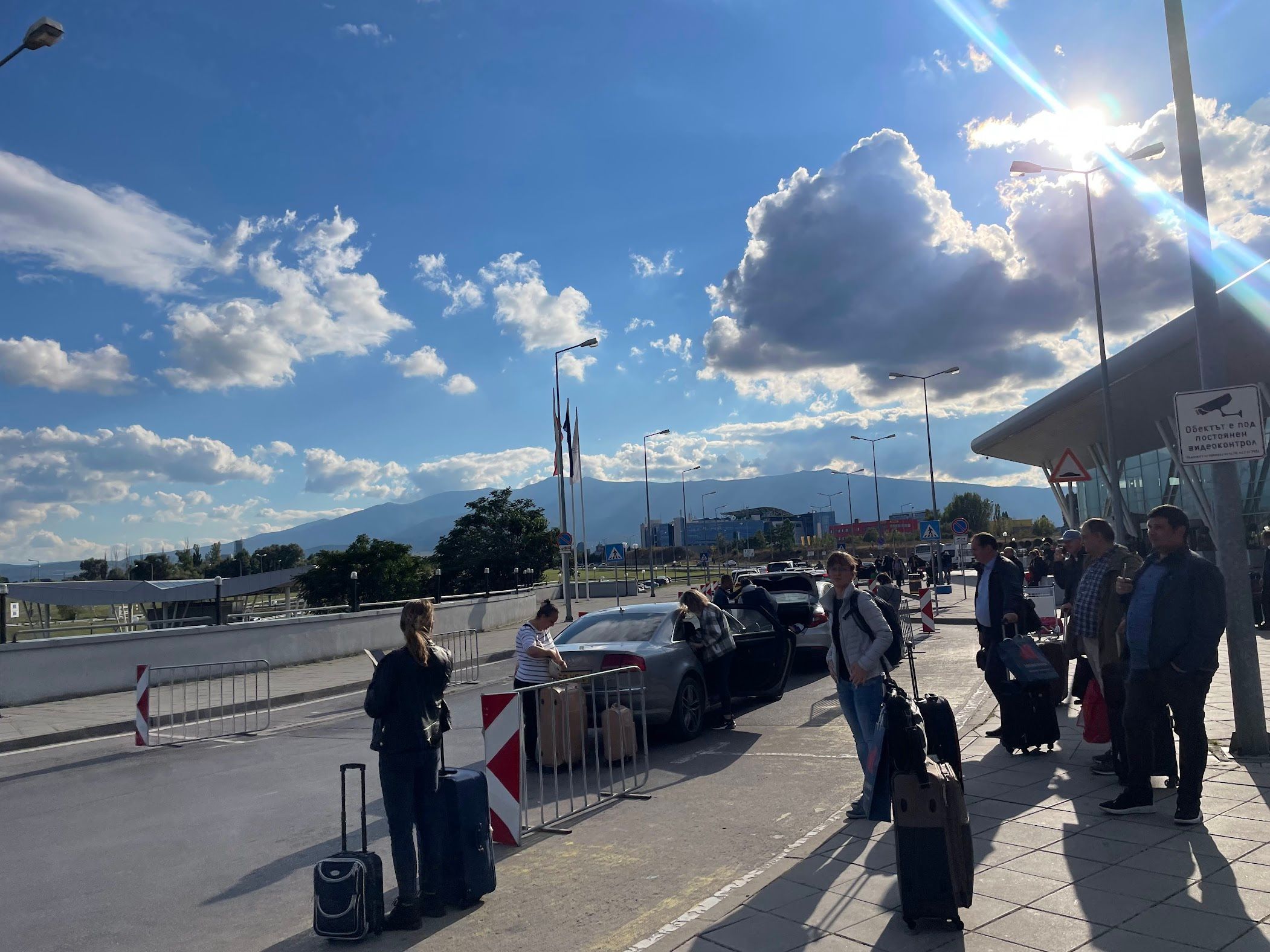
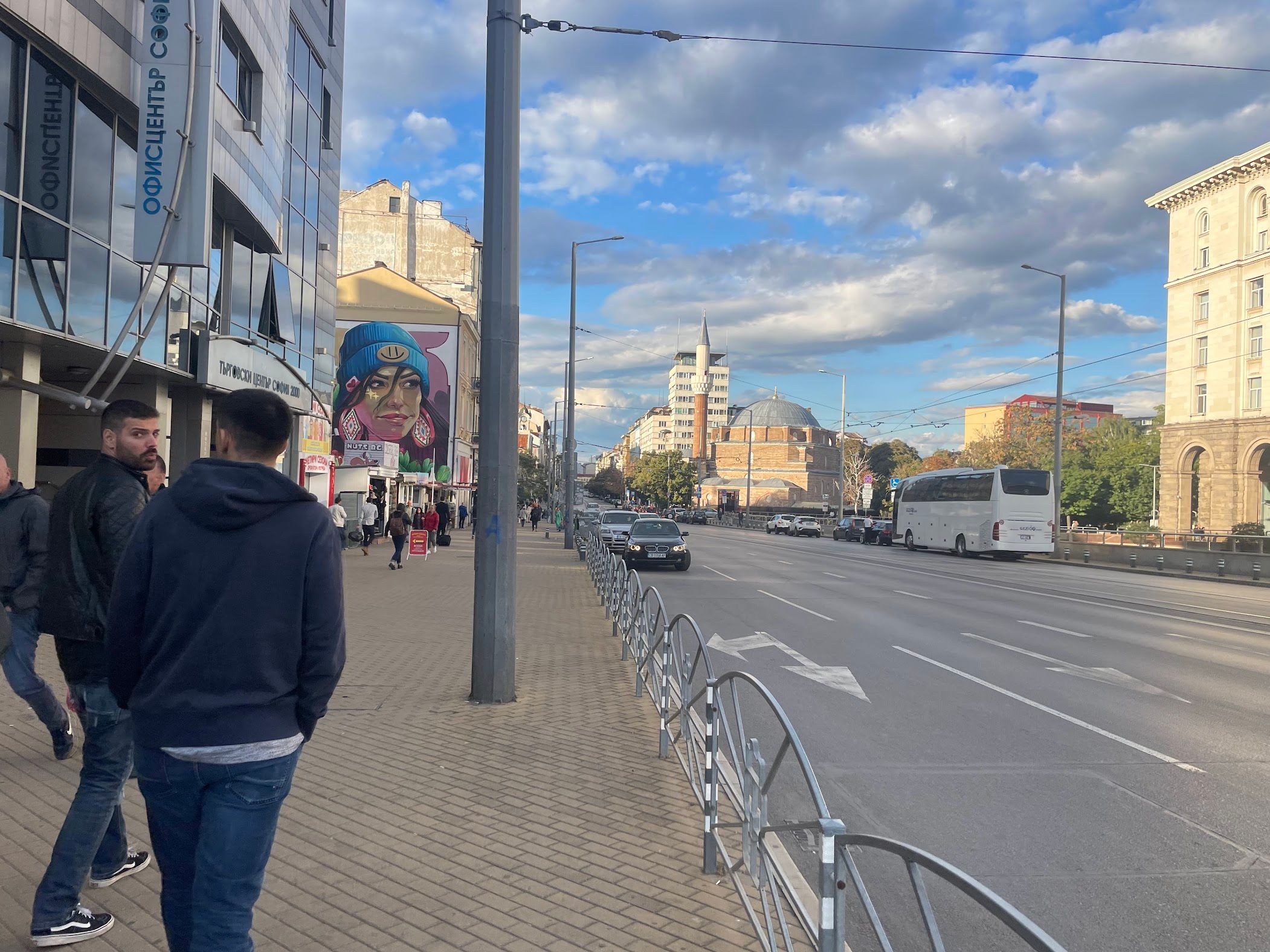
Did a walking tour on the first day. Some young kids invited us all, then they were like “20 euro plz.” We all collectively groaned, but good for them. Went out to some bars. Met some people. There was a couple in their 40s who made a joke about feeling 60 years old due to all the drinking. That was not funny, mainly because if you’re at that age and still going about like a tumbleweed, it makes people feel bad for you because it’s hard to imagine someone who seriously enjoys it, so they’re probably in self-denial.
I did this wine tasting where I understood that the host felt frustrated about Bulgaria being dominated by the Byzantines, then the Turks (5 centuries), then the Russians, and now being drained of its young people by the EU. So for a large portion of the history Bulgaria had been dominated by Muslims and had no wine. But he was proud of his country, his people, and the history, like all things should be.
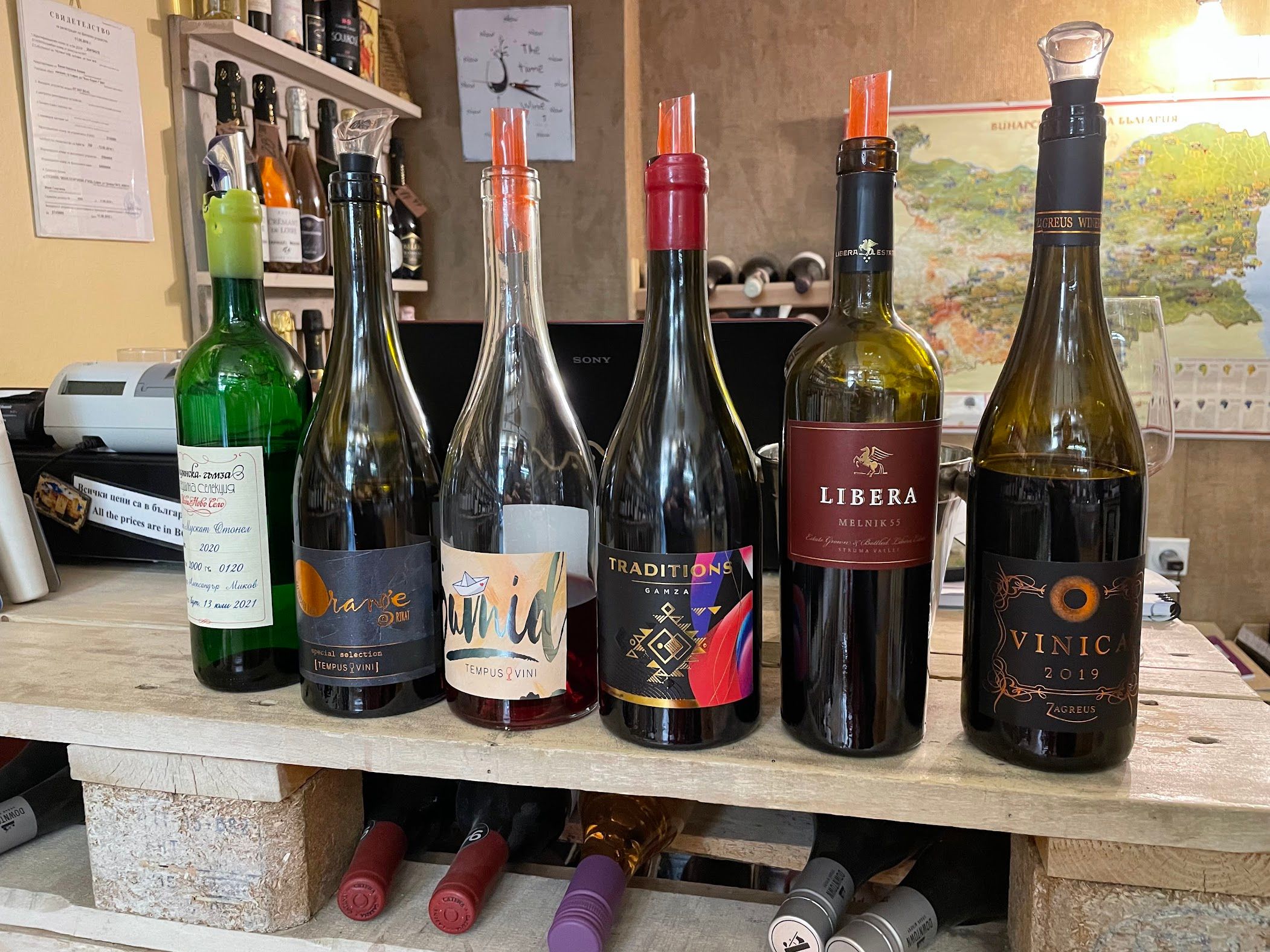
I also saw the tourist shops. They had a bunch of old Soviet stuff, which would be a unique souvenir. It was expensive though.
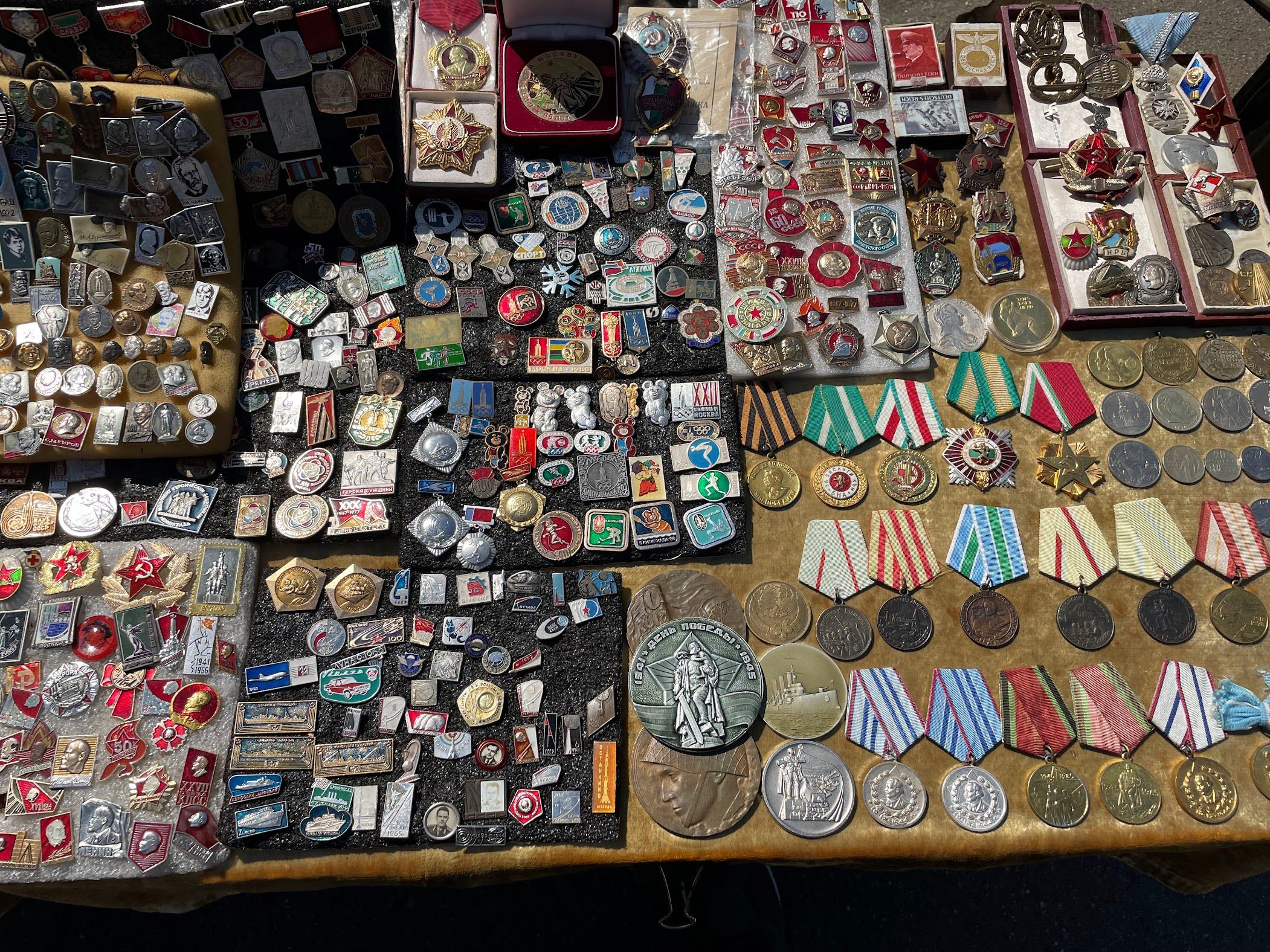
On current cultural trends and participants
We had a diversity training. One thing that was notable was that we were in different groups and there were rules for each group. So if you switched groups, you’d have to learn the new rules. Most people implicitly believe their rules are correct. Having a self-centered perspective challenged was a thing this game did well.
Something I disagreed with is that I remember the teacher talking about oppression and it was because of ‘white supremacy’. There is oppression, discrimination, denial of access to resources, but I don’t think ‘white supremacy’ captures it in full. It’s not as if they’ll all colluding and think they’re better than others. There are innate human instincts common to all people which reinforce certain groups, such as rich and poor and so on.
I didn’t like how the program valued intellectual homogeneity. It was quite important from the interview that participants stuck to the party line, such as COVID vaccinations. Look, I am not against vaccination, but I think it’s worth researching significant concerns. Not everyone can read Plotkin’s Vaccines. And I was fully for the government, authorities, researchers, and teachers, until I personally experienced that many of them have no depth of thought.
When a speaker was talking to us in Nuremberg about his experiences in Vietnam, about a third to a fourth of the participants decided to just walk up and leave. White participants lectured minority participants about their political beliefs while simultaneously pretending they didn’t exist. There were a lot of people in the Cologne group chat who made spelling mistakes such as affect/effect, zenophobic/xenophobic, and so on, and continue to make significant spelling mistakes.
This significantly dampens the quality of the exchange program and gives Germans a bad impression of America. There is also a member of German parliament who is supposed to act as the Paten (sponsor). When I met with mine, I found that she did not even know of me or was involved in any participant selection. The CBYX administrative team in Germany is just randomly sending out these emails.
If I were organizing the program, I would cut the amount of Young Professionals participants by half from 75 to around 35-40. This creates less work for the team and increases funding for the participants. 250 Euros seems like the high schooler stipend. I’d then raise the selection criteria bar. I don’t know if it’s feasible based on the ECA’s program funding guidelines, however. Another idea is that students are responsible for applying to universities themselves, using the program’s network in case they have any snags. They should build a degree of independence. Students shouldn’t be confined to a specific city but rather should at least have 2-3 choices. This lack of choice meant a lot of people were sent to suboptimal places.
More on participants
There’s an upside and a downside: the upside is that students who might not be as accomplished, come from rural places of the United States, and wouldn’t normally get opportunities will be selected for what may a life-changing opportunity for them.
The downside is that some people and some program organizers don’t seem… that competent or worldly or understanding? And you can see it in the grammatical mistakes, the poor contrast color in fonts used in pamphlets, and other small tells, like not knowing what the Bundestag is. And it’s not the unaware type of ignorance but the static type of ignorance. I read another participant’s blog from the previous year, and apparently their CBYX friends accosted an 82 year old man for a grammar mistake? (Archive.org link) Seriously immature and evil.
But I don’t know, is youth a justification? I don’t think so because not every 20-something year old does things like that. Is it overall competence? What people were not selected so that others were selected? Were they more or less competent? And what does it say of program organizers that they picked people like this? Does it reflect more on the selection pool or or the interviewers?
I don’t have any complaints about the American side of the team. I thought they were empathetic, kind, and arranged things well. And ultimately in cases like this, it’s down to one or two people making the decisions and being the point person. Don’t shoot the messenger, but the messenger seems to be making the decisions?
If you had good career opportunities, I would not choose this program. I cannot speak for the quality of other ECA (Bureau of Educational and Cultural Affairs) and of the other CBYX programs. I did it because I always wanted to understand another country well, and I felt the environment reminded me of where I grew up. You would see kids being independent and walking to school. And Germany really was like that.
If you came from a background that already had connections, why would you go to Germany on a few hundred dollar stipend?
I think it’s important that people applying for this program (and note, program quality may change while the name stays the same so this may be inaccurate many years down the line) truly understand the context and downsides. To not welcome honest criticism is inauthentic and bad for the long-term. Being truthfully critical in the right circumstance is one of the best things you can do for another person, yet so many people take it poorly. Sucks, that’s human nature I guess.
An African family in Frankfurt Hbf
Here’s an interesting scene I experienced and will describe to you all.
An aid worker (American, gay by the intonation of his voice) berates an African family in a hole-in-the-wall sanctuary tucked away in a corner of Frankfurt Hauptbahnhof. They had no tickets, seemingly no concrete plans, and no place to stay. The father states that a friend had promised him work here, and that they would be arriving in the morning. The American aid worker is incensed because rules are rules, and one cannot simply overnight in this part of the station. His shouting reaches a peak as he simply cannot understand how someone would think like that.
I think he was pissed at everyone, even the skinny homeless German girl who came in and asked for some bread. Should he have acted better? Or would other people be equally pissed and stressed in that situation? His co-workers were not like that.
Sickness and bad placement
I got placed in Konstanz. They told me Dresden, but changed it at the last moment. I was already accepted to TU Dresden and was planning on going there.
So I went down to Konstanz, noted how the people in Baden-Württemberg talked in a unique accent, saw how the cities near the Bodensee were just so clean and nicely laid out, and did some orientation stuff at Uni Konstanz. I got placed with a single lady who smoked as my ‘final placement’ when I have allergies, and I guess we didn’t get along (she was weird and demanding and I didn’t like that) so she decided to kick me out.
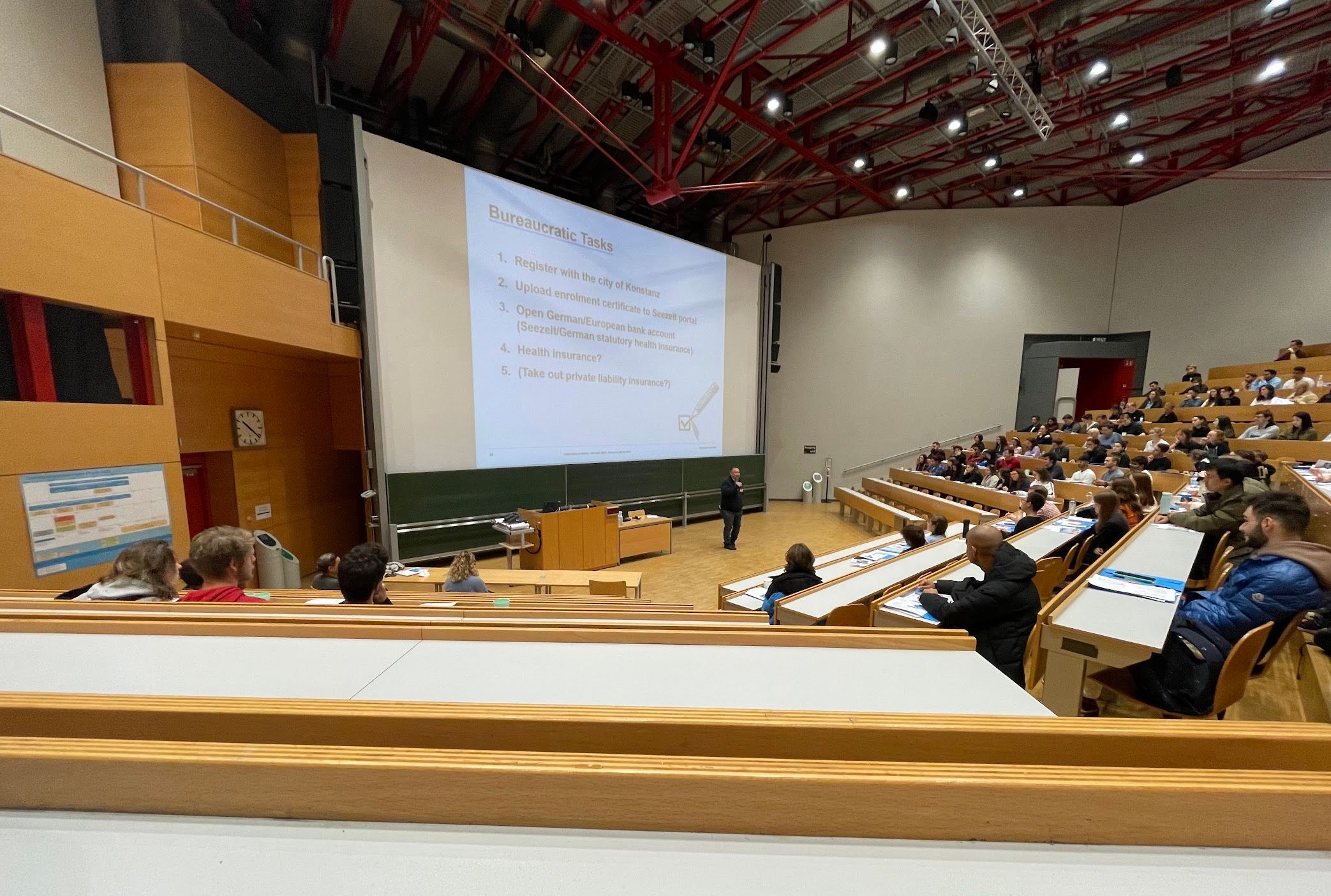
So here I was stuck in a completely new city, and the program says: we are arranging you permanent housing in Radolfzell at some 1970s barracks-style dorm with a dirty bathroom with unhygenic economic migrants trying to make a life in Germany. (I hate to say it like this, but it’s the most concise way I can say it. They were friendly though.) Oh, and it’s an hour away from Uni Konstanz. Be grateful. If you find housing somewhere else, you could move out from the barracks. Here’s a warning letter, by the way.
At Uni Konstanz I talked with a variety of people. There was this Irish girl who was really bookish and seemed inspired that I understood she read so many books because she could visualize what she read really well. And there were the weird social dynamics like this one American guy from New York trying to impress a hot French girl who reveled in the attention, the other guy who was really young and idealistic and maybe naïve and everyone could tell when he was talking, this Ukrainian girl who acted the way in which Slavic women often are, this dude from Norway who was cool and nice, and this dude from England who talked a little bit about political parties in England with me. I don’t remember the things but I remember the vibes.
I realized this whole housing situation was crazy (unsuitable for long-term habitation) and I couldn’t bear living in such conditions anymore, so I decided, might as well move to Dresden at my own expense if they said I could move somewhere else anyways. But it turns out I did it right when there is a huge housing shortage in Germany, naturally, at the start of college season, and proceeded to move between Airbnbs too many times. I then got a place to live but ended up developing an autoimmune disease, bier spots on my hands, severe pain in my upper left quadrant of the abdomen, loose teeth, and optic neuritis whenever I ate anything other than meat and rice. Oh, and I had foamy urine. I seriously believed I was going to die of kidney disease.
I read a lot of books about death and came to some understandings so I’m not so afraid of it anymore. There is this feeling when you believe you are about to die and your whole perspective on the world changes. In some cases you become more forgiving. You also get more anxiety. It settles down after a while. You understand things as they are and understand what things are important.
Permanent Placement Overview
Dresden was a decent city, but I didn’t like how the Elbe split the city into two. If I had to stay in East Germany, I think Leipzig is more convenient and better-connected with ICE trains. Though I was close to Prague and Poland, I didn’t go because, well, I was super sick. Now that I feel a bit better, I do wish I had gone, but it’s whatever. I made the right choice given the context.
There’s a chain store called go asia that has a lot of really good Chinese imports. I got really good at Chinese cooking and became aware of more starches such as taros, cassava, and so on. I visited IKEA–it was about the same as the USA, but the appliances were a bit smaller and better priced. European-style ranges rather than ovens.
Honestly, I don’t think the racism is that big of a deal. East German racism comes from people being upset about their economic condition and foreigners. Western German racism is because they think they’re better than you, and they sometimes are. Would I feel bad about an old paraplegic insulting me? Not really. Do poor redneck protestors bother me as much as rich “protesters”? Not really. I think what bothers me is how inauthentic it is for the wealthy and powerful to feign weakness and then attack those who actually are. It is the opposite of moral and royal authority as given by Ibn Khaldun in the Muqaddimah. It is the type of behavior liked by fully able-bodied adults who would enjoy bullying children and paraplegics.
…we find in them an eager desire for goodness and good qualities, such as generosity, the forgiveness of error, tolerance toward the weak, hospitality toward guests, the support of dependents, maintenance of the indigent, patience in adverse circumstances, faithful fulfillment of obligations, liberality with money for the preservation of honor, respect for the religious law and for the scholars who are learned in it, observation of the things to be done or not to be done that (those scholars) prescribe for them, thinking highly of (religious scholars), belief in and veneration for men of religion and a desire to receive their prayers, great respect for old men and teachers, acceptance of the truth in response to those who call to it, fairness to and care for those who are too weak to take care of themselves, humility toward the poor, attentiveness to the complaints of supplicants, fulfillment of the duties of the religious law and divine worship in all details, avoidance of fraud, cunning, deceit, and of not fulfilling obligations, and similar things.
Touring the Reichstag
This was one of my highlights of the trip. I got a tour of the Reichstag, watched a parliamentary debate, and came to understand more of the history behind the place.
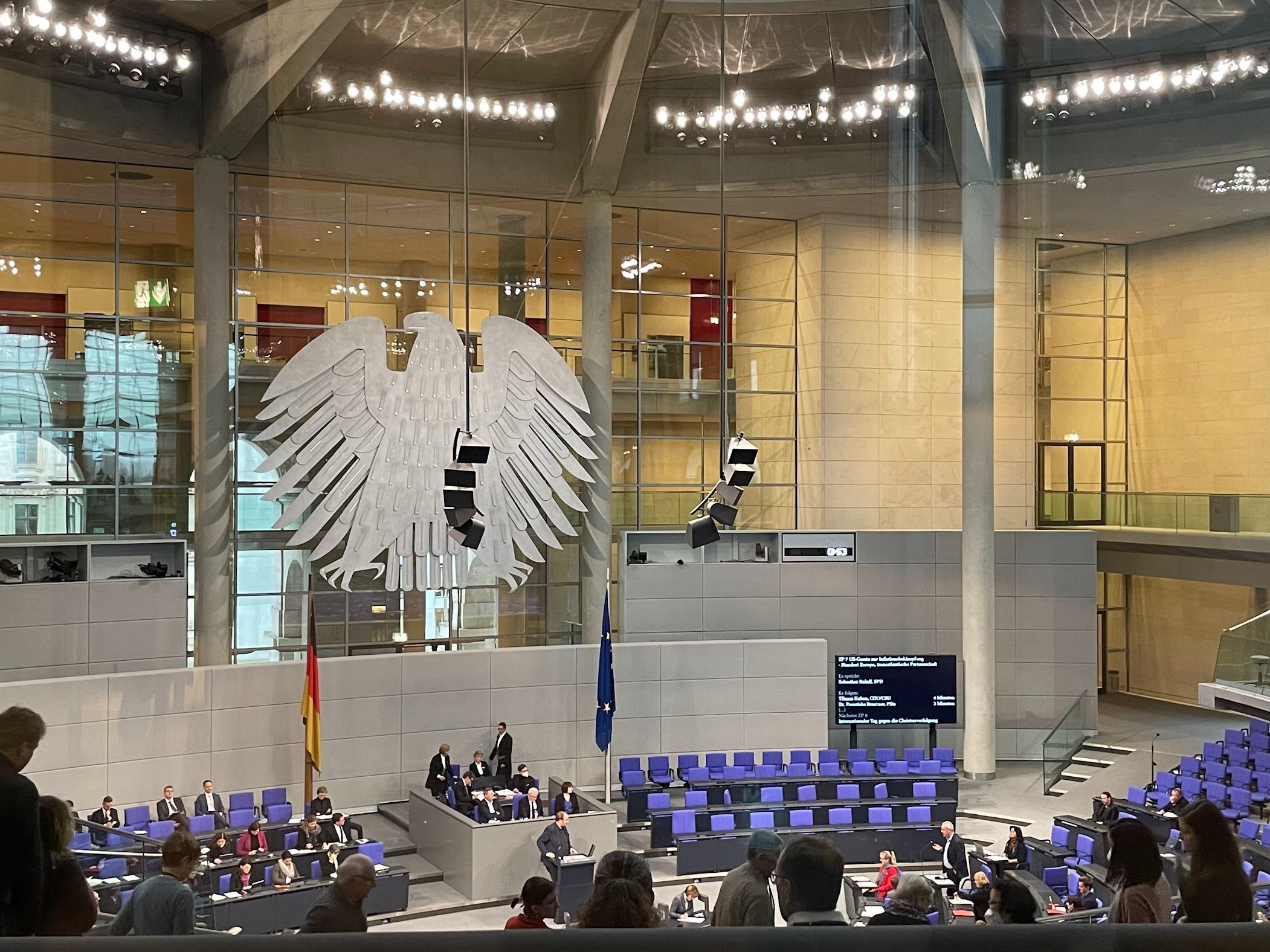
During the parliamentary debate, I couldn’t help but notice members looked bored when people were speaking? It’s as if the party perspectives were already decided and the debate was just a performance act.
There are 4 light columns in the Reichstag which come from the 4 tilings of Germany after WW2. They were supposedly funded by each country as a dedication to German reconstruction.
Hitler has an mailbox in the basement because he was democratically elected. It was an art installation by a Jewish artist.
University
I feel like the computer science lectures at TU Dresden are better at Georgia Tech. Well, they’re not “better”, they’re significantly harder and provide less support. Seriously, the Computer Graphics course covered advanced material at least twice as hard as Georgia Tech’s Computer Graphics course. Supposedly a lot of people were confused, except for this one hacker kid who seemed to know everything. Lots of Eastern Europeans. Some East Asians.
The cafeteria was great. Good pricing, reasonable food, beautiful library too. I just audited the classes since I was getting sicker and sicker during my time in Germany.
Midyear Seminar
On January 12th, 2023, Consul General Timothy Liston came by Nuremberg to give the Congress-Bundestag Youth Exchange for Young Professionals cohort a talk about the history of Germany and the United States and to comment on current affairs.
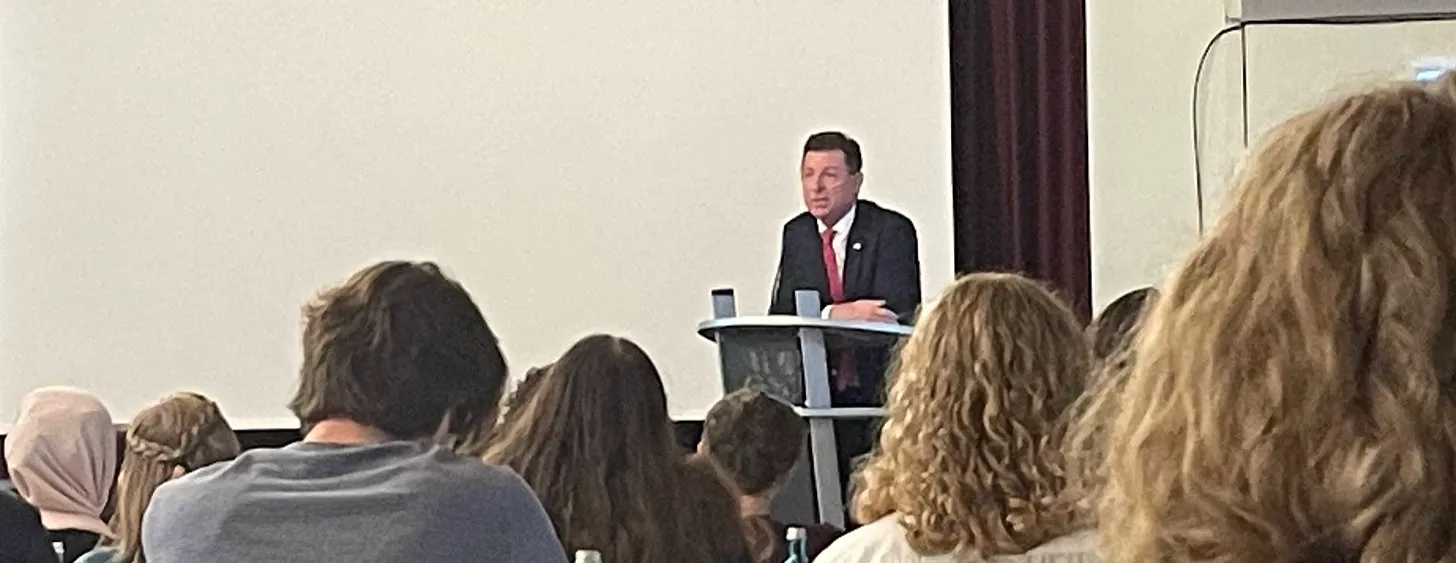
Some introductory statements and claims:
“Germany is our most important partner”
Germany was the first country visited by Blinken after being appointed
Blinken has visited Germany the most, a total of 7 times. However, Wikipedia states Japan as the first visit.
He studied at the War College
“how to make Europe not do war again”
“Create a Europe that is secure, prosperous, and peaceful”
Recommended the Kennan Cable
Cable stated that the Soviets are not our friends, they have designs on Europe that are exactly counter to the principles and interests of the USA
“declassified, worth the read”
Some remarks on the Marshall Plan
Germany was not the largest recipient but the fastest growing
Germany then gave back. He mentions the German Marshall Fund, a think tank in Washington DC.
Without the relationship in arts, culture, science, it all wouldn’t exist.
Fulbright, German American Program
Talked about BMW Spartanburg, believes in local education/trades
Grouped electrician and computer science together
If you go to the Governor’s office then they will give a lot of tax benefits
German businesses create value (90k jobs), a third of those are from Bavarian companies
Intel, Apple, TI then go to Bavaria
25,000 soldiers in Bavaria over 4 bases (MILSEC, Einzbach, something else, something else)
Allowed the US, basically 17 million diplomats, to be a part of a new community
Training Ukrainian soldiers on HIMARS (20k) in Bavaria
He states “the US simply cannot lose Ukraine to a dictator in Russia”
Q&A - Remarks after his main speech
Q: What does the State Department need?
This question would’ve been easier to answer before the Ukraine War. In Europe, this war will end and a lot of work needs to be done. The ability to fight disinformation? Russians are great at disinformation.
Believes that for climate change, developing countries need to “bend” their emissions to meet standards
Look at the investment flows and not the trade. He did 7 years in Vietnam and there were 100 tariffs on US goods. That’s long gone with the European Union. How do you maximize the similarities and commonalities in the free market system to counter the barriers to work together in areas we are losing ground in?
China has really good infrastructure. Repeated statement about debt trap diplomacy.
Article 5 was only invoked once, in 2001.
In regards to nuclear weapons, we work very well with the Russians (since the Soviet times). SALT I, II, these are what relationships are built on
We need more foreign service diversity, not just the “male, pale, Yale”. He wants to go to HBCUs and target underrepresented groups.
Being Consul General in Bavaria is good. Going to Free Uni Berlin to speak about GMOs while he was in the economic office was not a fun time. His friend in Leipzig has a lot less warm of a reception.
Leipzig CG needs to create a narrative about what the US is doing, whereas West Germany is invested in US elections. People protest because they have a different experience. How do you get over that?
East Germany → 25% Saxony-Anhalt is AfD, right radical, being investigated, etc. These are not “good people,” some people you would see in Charlottesville, and have connections to foreign countries
Example of his personal perspective: 7 years in Vietnam, even if gov. systems are not the same, you can find places of trust.
Admitted US did bad things in Vietnam, only took 3-5 decades to admit it, lost 56k soldiers, lost millions, tons of mines and more bombs than WW2, but committed to clean them up
1991 → donated over 185mil to address these bomb projects
Spent two weeks in the Vietnamese muddy jungle to look for the remains of a pilot that slammed into the mountain while spending time with local Vietnamese
There were 3 main war era asks, one of which was to clean up agent orange. Didn’t hear the other two.
Q: The IRA, the CHIPS Act, those two are targeted to very big industries in Germany. What has the response been?
Look, look at what it is, the largest bill in history to deal with climate change (billions of dollars, president biden took it upon himself)
There’s a lot of legislation with thousands of pieces of documents, working with government agencies to make sure you give the opportunity to as many people you think, to fight “climate change.”
Germans think it is protectionist, but he says they have the same opportunity as US companies.
He believes Germans are envious because they can’t do something similar as it’s run out of Brussels. Brussels is where trade policy is made. Once the discussions are had, they are realizing there are a lot of opportunities. Does it look after the US? Of course. Do we want to exclude companies that actually bring solutions? No, and bmw, audi, etc. daimler, have been doing a good job in taking advantage of this
They’re putting together a 1-pager that can be sent out.
Personal Thoughts
He had 4 bodyguards with him. Is this normal for a Consul General?
Don’t agree with the climate change perspective—how are developing countries going to develop?
The narrative in US media is usually representative of thoughts at the highest level
When I attended the Bundestag Plenary Debate a week ago, the IRA was heavily debated. However, it seemed as a kind of “pointless show,” as if the debate contents were already known. People from other parties didn’t pay attention to the speeches that much and seemed bored.
The “1-pager” that can be sent out makes sense. There are people in the German embassy in the US who will travel to the Pentagon to get clarification on things. There is a consistent back and forth of diplomats who carry messages and reduce miscommunication.
Why is BMW Spartanburg mentioned so much? Maybe b/c the US has a car culture. Maybe it’s actually a really large scale investment that I’m not realizing due to not having visited many car factories.
There is an art to asking questions and being curious based on people’s background. I should’ve asked a question about the War College, but I instead was preoccupied with trying to fit an answer into my own direction.
We stayed at this hostel. They said they had a doctor on-call but they really didn’t. “Gluten-free” is just a hypothetical, places don’t actually serve food that doesn’t irritate the intestinal tract because people don’t realize what foods cause sensitivites. I got eczema. Was depressed the whole time because of autoimmune reasons and bad health.
The water machine (Brita) was the most pure water and best I ever tasted. It was this metal box and I can’t find it online anywhere. I should’ve looked for a model id.
As for the rest of the seminar: just a bunch of “reflective” events, nothing too notable.
Thinking of applying?
If your best option is doing a program like this versus moving home after college, I’d still go for this program despite the drawbacks. As long as you don’t have any serious health or financial issues, you should be able to handle the inopportune stresses, and you’ll look back with good memories.
I will say this once again, directly: this program is not meant as a career or high-achievers’ program. You literally get like 250-275 Euro to live on. The housing and placement risk is too big and changes at a whim. One of the people on the program my year wanted to study homeopathic medicine. If you really wanted to move to Germany for a while, you honestly could do it yourself. However, it does get you a sense of how things are in Washington DC, the Bundestag, and provides you with a platform to move forth and do things.
It is in many ways an opportunity for people from lesser represented places in the USA (both lesser developed states and small cities) to move to a developed country, which may actually be easier than a move within the USA due to rent prices. And I have to put myself in someone else’s shoes, right? Not necessarily everyone has traveled before and has “seen” things and “gets” things. This could be really different and really great for them. I’m happy for these people and the fact that they can have something more in their life. I feel like the midwest people (Dakotas, Montana, Minnesota, Nebraska, etc.) have the best connection to Germany personality-wise, but don’t take my word for it.
If your career path is on track to tech, big 4, research, etc. already, don’t bother with this program. If it’s research or an internship there are more specialized options such as DAAD and so on, which will already get you to Germany. It’s better as an early college program than a post college program. You do not want to be hanging out with Erasmus students on their party semester as a 24 year old.
I’m sure lots of different people of different backgrounds are reading this. If you get it, you get it. If my writing doesn’t align with you, there are tens of other people who have experienced different things and would say different things, but I’ve tried to be as objective for the period in which I’ve experienced these things yet realistic to my own feelings.
Random thoughts
- Luxembourg has free eduroam everywhere
- Why is the train station in Brussels so run down?
- I thought the “Eifel” (mountain range) was the Eiffel Tower at first.
- Gerolsteiner.
- You’ll miss how nice German bathrooms and buildings are
- OH! IMPORT TAXES SUCK! DO NOT SHIP EXPENSIVE THINGS TO GERMANY!
Conclusion
This was a good time in my life, looking back. It was a time of great personal growth and understanding. I’m sad that I wasn’t able to enjoy the most out of it due to health issues, but I did have memorable moments. I’m doing a bit better now. Meditation, praying, and variations for mental fortitude help a lot.
This experience was a distinct period in my life that felt different, vibrant, and alive. I’ve had a few of these: my childhood until 11 or 12 when my family moved away to Georgia, grades 9, 10, and 11 when I felt socially connected and outgoing, the beginning of college when I was learning and exploring and traveling to different countries, and that time in Germany.
Most time otherwise has been monotonous, uninspiring, or even depressing. I think this speaks to the importance of the people around you and your environment. You can get used to living in the drudgery of American suburbs where your head is contorted by the seat and everything smells chemical and is loud, but it makes you different in forcing yourself to get through things, feel differently in how you approach the world, and think differently in that you have to just survive. Going to the grocery store becomes an expensive and stressful ordeal over the interstate for what should be a simple human need. In contrast, life in its inspiring, high-energy, high-detail growth state is beautiful.
Vielen Dank für Ihre Aufmerksamkeit.